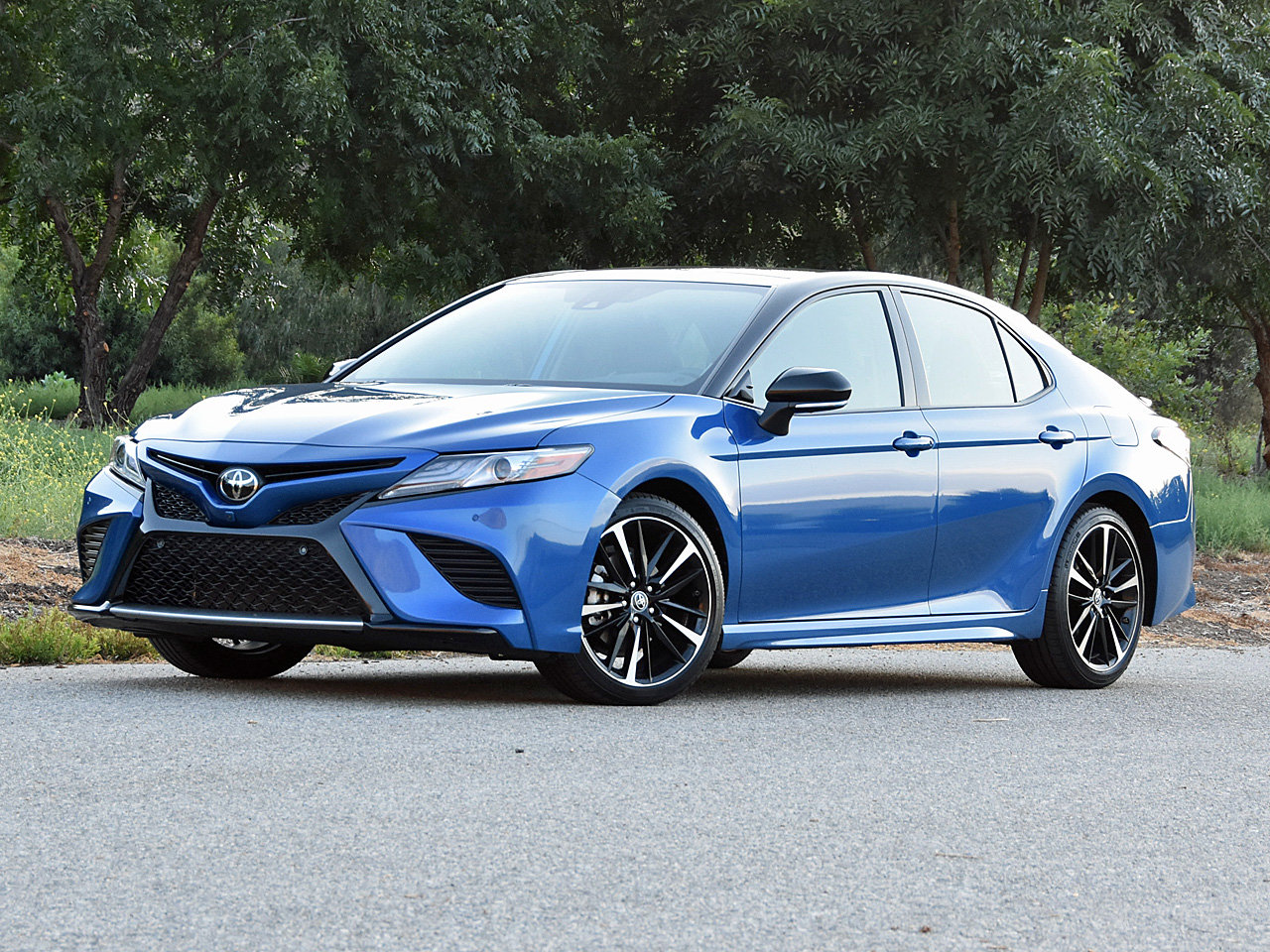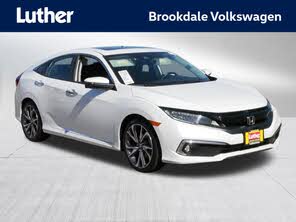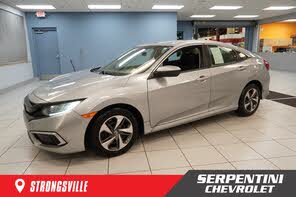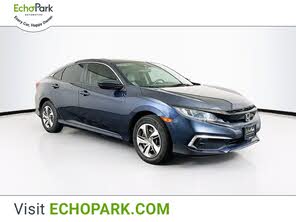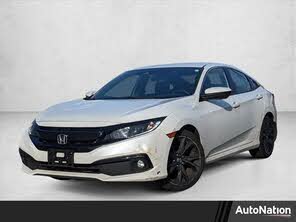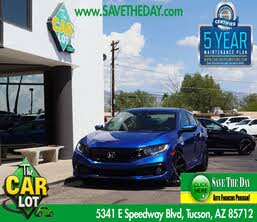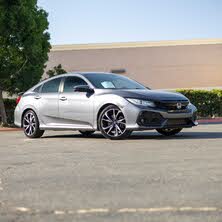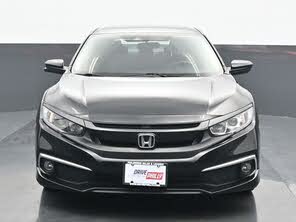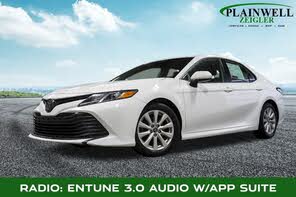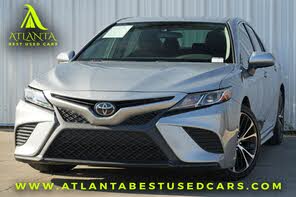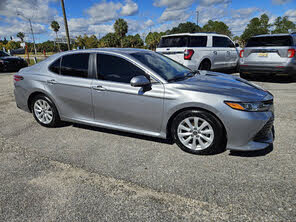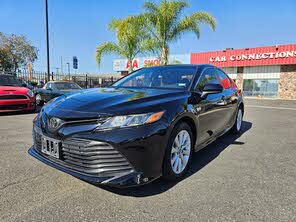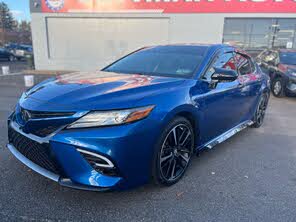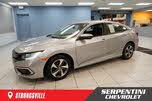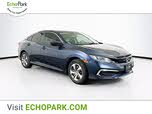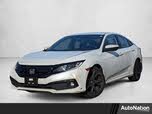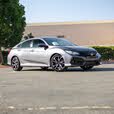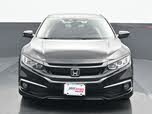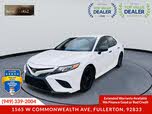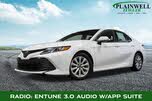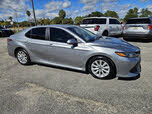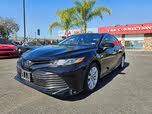2019 Honda Civic vs 2019 Toyota Camry
Overview | |
MSRP$24,095 | MSRP$19,550 |
Listings1358 | Listings1373 |
Ratings & Reviews | |
User Reviews | User Reviews |
Expert reviews7.8 out of 10 | Expert reviews7.8 out of 10 |
Pros
Cons
| |
2019 Toyota Camry Reviews SummaryBlame the Toyota Avalon for the Toyota Camry’s flaws. In order to put daylight between itself and Toyota’s larger full-size sedan, the midsize Camry is now smaller than some of its competitors, while simultaneously offering fewer of the increasingly expected features in the segment. Still, there are several good reasons to consider a 2019 Camry, from its outstanding safety ratings to its free scheduled maintenance plan. It’s also one of a handful of family sedans that still offers a 6-cylinder engine. | |
2019 Honda Civic Reviews SummaryThe tenth-generation Civic has been out since 2016, and for 2019, Honda makes only minor tweaks to this compact car's winning formula of style, value, and performance. Lots of cars are good these days, but the Civic has been consistently good for more than 45 years. This is a car that drives and feels like a more expensive car, and whether you choose a sedan, coupe, or hatchback among four engines and two transmissions—hooray for variety—the Civic rewards you. The 2019 model reminds us why. | |
Popular Features & Specs | |
Engine2.5L 203 hp I4 | Engine2.0L 158 hp I4 |
Drive TrainFWD | Drive TrainFWD |
Seating Capacity5 | Seating Capacity5 |
Horsepower | Horsepower158 hp @ 6500 rpm |
MPG City29 | MPG City25 |
MPG Highway41 | MPG Highway36 |
Engine | |
Engine Name2.5L 203 hp I4 | Engine Name2.0L 158 hp I4 |
Torque | Torque138 lb-ft @ 4200 rpm |
Horsepower | Horsepower158 hp @ 6500 rpm |
DrivetrainFWD | DrivetrainFWD |
Fuel Economy | |
MPG City29 | MPG City25 |
MPG Highway41 | MPG Highway36 |
Interior | |
Seating Capacity5 | Seating Capacity5 |
Safety | |
Front Crash Overall5 | Front Crash Overall5 |
Side Crash Overall5 | Side Crash Overall5 |
Dimensions & Capacity | |
Cargo Space14.1 cu ft | Cargo Space15.1 cu ft |
Curb Weight3241 lbs | Curb Weight2742 lbs |
Height56.9 in | Height55.7 in |
Length192.1 in | Length182.3 in |
Width72.4 in | Width70.8 in |
Wheelbase111.2 in | Wheelbase106.3 in |
Maximum Payload925 lbs | Maximum Payload |
Number of doors4 | Number of doors4 |
Overview | ||
MSRP | $24,095 | $19,550 |
Listings | ||
Ratings & Reviews | ||
User reviews | ||
Expert reviews | 7.8 out of 10Read full review | 7.8 out of 10Read full review |
Pros & cons | Pros
Cons
| |
Summary | Blame the Toyota Avalon for the Toyota Camry’s flaws. In order to put daylight between itself and Toyota’s larger full-size sedan, the midsize Camry is now smaller than some of its competitors, while simultaneously offering fewer of the increasingly expected features in the segment. Still, there are several good reasons to consider a 2019 Camry, from its outstanding safety ratings to its free scheduled maintenance plan. It’s also one of a handful of family sedans that still offers a 6-cylinder engine. | The tenth-generation Civic has been out since 2016, and for 2019, Honda makes only minor tweaks to this compact car's winning formula of style, value, and performance. Lots of cars are good these days, but the Civic has been consistently good for more than 45 years. This is a car that drives and feels like a more expensive car, and whether you choose a sedan, coupe, or hatchback among four engines and two transmissions—hooray for variety—the Civic rewards you. The 2019 model reminds us why. |
Video | ||
Popular Features & Specs | ||
Engine | 2.5L 203 hp I4 | 2.0L 158 hp I4 |
Drive Train | FWD | FWD |
Seating Capacity | 5 | 5 |
Horsepower | 158 hp @ 6500 rpm | |
MPG City | 29 | 25 |
MPG Highway | 41 | 36 |
Engine | ||
Engine Name | 2.5L 203 hp I4 | 2.0L 158 hp I4 |
Torque | 138 lb-ft @ 4200 rpm | |
Horsepower | 158 hp @ 6500 rpm | |
Drivetrain | FWD | FWD |
Fuel Economy | ||
MPG City | 29 | 25 |
MPG Highway | 41 | 36 |
Interior | ||
Seating Capacity | 5 | 5 |
Safety | ||
Front Crash Overall | 5 | 5 |
Side Crash Overall | 5 | 5 |
Dimensions & Capacity | ||
Cargo Space | 14.1 cu ft | 15.1 cu ft |
Curb Weight | 3241 lbs | 2742 lbs |
Height | 56.9 in | 55.7 in |
Length | 192.1 in | 182.3 in |
Width | 72.4 in | 70.8 in |
Wheelbase | 111.2 in | 106.3 in |
Maximum Payload | 925 lbs | |
Number of doors | 4 | 4 |
When it came to their external appearance and overall feel, both the 2019 Toyota Camry and the 2019 Honda Civic had distinct characteristics that attracted different sets of buyers. The 2019 Toyota Camry was offered in standard and sporty versions, with engine options including a 4-cylinder, a V6, and a hybrid powertrain. The Camry lineup consisted of trims such as L, LE, XLE, SE, and XSE, catering to diverse preferences. One notable variant was the Camry XSE V6, which featured a bold design and came packed with exclusive features like a sport-tuned suspension, 19-inch aluminum wheels, and a distinctive Blue Streak paint job with a Midnight Black roof. This variant not only promised a thrilling drive but also included Toyota's Driver Assist package. Priced at $39,669, including the destination charge, it aimed to provide a sporty experience within the midsize sedan category.
Despite its design flair, the Camry's styling choices sometimes felt unresolved. The design seemed to be a significant departure from the traditionally bland aesthetics of its predecessors. While the Camry XSE aimed for a daring look, the execution appeared oversize and somewhat mismatched with the car’s proportions. In contrast, Toyota's larger Avalon successfully implemented similar themes, and the compact 2020 Corolla SE and XSE trims also managed to strike a better balance. Inside, the Camry XSE’s interior embodied a high-end feel, courtesy of its soft-touch surfaces and enhanced upholstery. However, certain aspects, such as the fabric-wrapped windshield pillars and some switchgear sourced from the Toyota Tacoma, detracted from its upscale intent.
Compared to the Camry, the 2019 Honda Civic was lauded for its more consistent and appealing design language. Although not as high-end as the 2019 Mazda3, which aimed to attract buyers of premium models like the Audi A3 and Mercedes-Benz A-Class, the Civic offered a blend of modernity and sportiness. Features like a new gloss-black upper grille, a revised lower bumper, and larger 18-inch wheels gave it a distinctive flair. The sedan’s silhouette, evocative of an Audi A7, was gracefully proportioned, while the wraparound LED taillights added a unique visual signature.
The Civic's Coupe and Hatchback variants further contributed to its versatile appeal. The Coupe balanced design and functionality, while the Hatchback offered an aggressive look and substantial cargo space. Interiors of the Civic stayed true to its high-tech yet simplified design philosophy. The central LCD for tachometer and speedometer, clean button layouts, and quality fit-and-finish underscored its high-quality build. Rear-seat roominess and cargo capacities varied by body style, with the Hatchback providing considerable storage up to 46.2 cubic feet with seats folded. Notably, the Civic’s switchgear, buttons, and materials felt durable and well-made, solidifying its reputation for long-term reliability.

















Performance-wise, the 2019 Toyota Camry and Honda Civic catered to different driving preferences. The standard 203-horsepower 2.5-liter 4-cylinder engine in the Camry sufficed for daily commutes, but for thrill-seekers, the available 301-horsepower 3.5-liter V6 engine packed an enticing punch. This engine, combined with an 8-speed automatic transmission and paddle shifters, delivered seamless gear changes in Sport mode. The sport-tuned suspension and 19-inch aluminum wheels enhanced handling, making the Camry XSE a fun yet comfortable daily driver. However, the heavy steering in Sport mode and certain drawbacks, like the “thunk” noise of the brakes and subpar fuel efficiency at 21.9 mpg, slightly marred the driving experience.
In comparison, the 2019 Honda Civic offered a broad range of engine choices to suit various performance needs. The base models, equipped with a 2.0-liter 4-cylinder engine generating 158 horsepower, delivered smooth and refined performance. The turbocharged 1.5-liter engine, standard on EX trims and above, provided 174 horsepower and superior mid-range acceleration. The Civic Hatchback’s 180-horsepower version of the turbo engine added a sporty edge, especially with the available 6-speed manual transmission.
For those seeking even higher performance, the Civic Si and Type R did not disappoint. The Si boosted the turbocharged 1.5-liter engine to 205 horsepower, while the Type R, with its re-engineered 2.0-liter engine, produced an impressive 306 horsepower. Both models exclusively offered manual transmissions, catering to driving enthusiasts. The Civic’s CVT also impressed with its ability to simulate gear ratios effectively, avoiding the common pitfalls of high-rev strains. Excellent steering feel, responsive brakes, and a well-balanced suspension system further underscored the Civic's commitment to providing a sporty yet practical drive.
The 2019 Toyota Camry and the 2019 Honda Civic showcased varied strengths in terms of form and functionality. The Camry’s cabin was practical, featuring ample storage options like a large center console bin and a hidden compartment under the wireless charging pad. However, the glove box was relatively small and hard to reach for the driver, and the door-panel storage pockets were narrow.
Trunk space in the Camry, measuring 15.1 cubic feet, fell short compared to rivals like the Honda Accord. The trunk floor was also short, limiting its ability to accommodate bulky items like full-size suitcases and strollers. On the positive side, the Camry's front seats, with 8-way power adjustments and heating, offered comfort even though ventilated seats were not available. Rear-seat passengers, however, faced a tighter space with narrow door openings and a low seating position, which hampered ease of access.
Conversely, the 2019 Honda Civic excelled in interior functionality. With the addition of a volume knob and shortcut buttons for the infotainment system, the Civic’s interior became much more user-friendly compared to its previous iteration. The center console featured versatile storage solutions, including sliding trays and removable cupholders. The sedan offered competitive cargo space with 15.1 cubic feet of trunk capacity, while the hatchback provided an impressive 25.7 cubic feet, expandable to 46.2 cubic feet with folded rear seats.
The Civic’s interior space was commendable, especially in the rear seat, where head- and legroom sufficed for long journeys. Optional features like the two-stage heated outboard seats added comfort, although the lack of rear air vents was a minor oversight. Despite these small misses, the Civic’s thoughtful design, combined with reliable switchgear, made it a practical choice for daily use.
Both the 2019 Toyota Camry and the 2019 Honda Civic incorporated modern technology but with varying degrees of execution. The Camry’s Entune 3.0 infotainment system, notable for its new interface and inclusion of Apple CarPlay, represented a significant upgrade. The dashboard layout and control placements were intuitive, ensuring ease of use even for those unfamiliar with touchscreen systems. Additional features included a six-month WiFi Connect subscription and Qi-compatible wireless smartphone charging. However, the system lacked Android Auto compatibility, which was anticipated in future models. The Camry’s navigation faced occasional delays in loading traffic data, impacting its real-time usability. The 9-speaker JBL premium sound system also fell short in audio clarity despite its advanced Clari-Fi technology.
In comparison, the 2019 Honda Civic featured an Android-based infotainment system that, while functional, lagged behind newer Honda models in terms of speed and user interface. However, standard Apple CarPlay and Android Auto ensured broad smartphone compatibility. The Garmin-based navigation within the Civic stood out for its superior graphics and reliable voice inputs. Honda's LaneWatch, providing a live feed of the passenger-side blind spot, added a layer of safety and convenience not commonly seen in this segment. The Civic’s 450-watt, 10-speaker stereo on Touring trims improved audio quality, eliminating previous issues with bass distortion.
Safety was a strong focus for both the 2019 Toyota Camry and the 2019 Honda Civic. The Camry showcased top-tier crash-test performances, achieving 5-star ratings in all NHTSA assessments and a Top Safety Pick+ rating from the IIHS. Standard safety features included the Toyota Safety Sense suite, encompassing adaptive cruise control, forward-collision warning, automatic emergency braking, lane-departure warning, lane-keeping assist, and automatic high-beam headlights. These systems operated efficiently, although the lane-departure warning’s persistent beeping was a minor irritant. Additional safety services under the Safety Connect subscription enhanced the overall safety offering.
The 2019 Honda Civic similarly emphasized safety, with the Honda Sensing suite standard on most trims. It included forward-collision alert, emergency braking, lane-keep assist, and adaptive cruise control—features typically charged as extras in this segment. The Civic consistently earned top ratings from the IIHS for crash tests and crash-prevention technologies. NHTSA awarded the Civic five stars in most categories, cementing its reputation as a safe and reliable choice.
CarGurus highlights
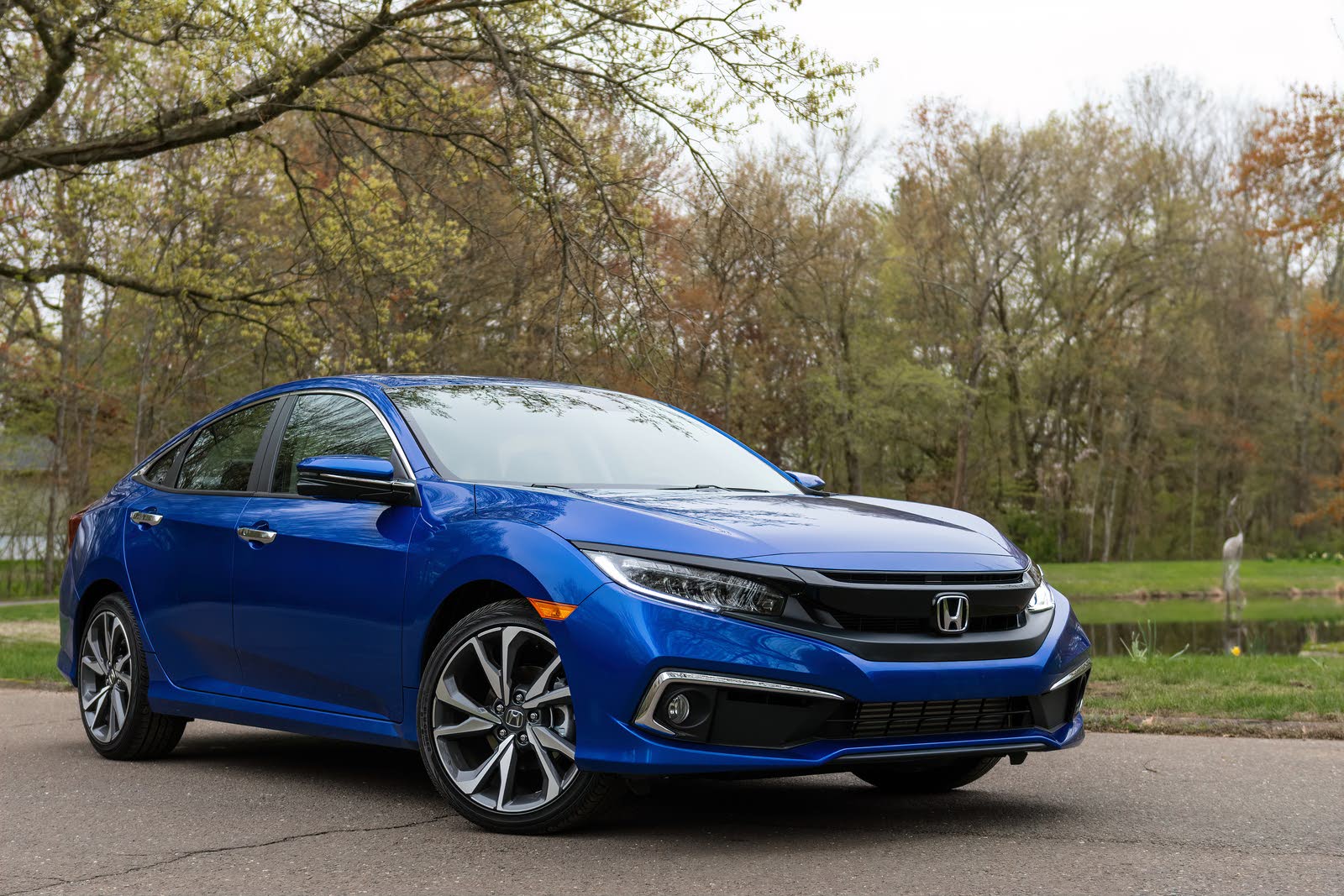
According to CarGurus experts, the overall rating for the 2019 Toyota Camry is 7.8 out of 10, while the 2019 Honda Civic scores 7.8 out of 10. Considering both vehicles scored identically, it ultimately depends on your specific needs and preferences. However, given the Civic’s superior blend of modern technology, practical interior space, sporty drive, and standard Honda Sensing safety features, it remains a slightly better-rounded choice for most consumers.
Choose the 2019 Honda Civic if:
- You’re looking for a compact car with a balanced blend of sportiness and practicality.
- You want standard Apple CarPlay and Android Auto for seamless smartphone integration.
- You need flexible cargo space, especially in the hatchback model, along with versatile and spacious rear seating.
Choose the 2019 Toyota Camry if:
- You prioritize top-tier safety ratings and advanced driver-assistance systems.
- You seek a mid-size sedan with multiple powertrain options, including a V6 and a hybrid.
- You value a high-quality interior with an intuitive infotainment system, despite minor design setbacks.
CarGurus highlights

According to CarGurus experts, the overall rating for the 2019 Toyota Camry is 7.8 out of 10, while the 2019 Honda Civic scores 7.8 out of 10. Considering both vehicles scored identically, it ultimately depends on your specific needs and preferences. However, given the Civic’s superior blend of modern technology, practical interior space, sporty drive, and standard Honda Sensing safety features, it remains a slightly better-rounded choice for most consumers.
Choose the 2019 Honda Civic if:
Shop Now- You’re looking for a compact car with a balanced blend of sportiness and practicality.
- You want standard Apple CarPlay and Android Auto for seamless smartphone integration.
- You need flexible cargo space, especially in the hatchback model, along with versatile and spacious rear seating.
Choose the 2019 Toyota Camry if:
Shop Now- You prioritize top-tier safety ratings and advanced driver-assistance systems.
- You seek a mid-size sedan with multiple powertrain options, including a V6 and a hybrid.
- You value a high-quality interior with an intuitive infotainment system, despite minor design setbacks.

By: CarGurus + AI
At CarGurus, our team of experienced automotive writers remain at the heart of our content operation, conducting hands-on car tests and writing insightful guides that are backed by years of industry experience. To complement this, we are harnessing AI to make our content offering more diverse and more helpful to shoppers than ever. To achieve this, our AI systems are based exclusively on CarGurus content, ratings and data, so that what we produce is both unique to CarGurus, and uniquely helpful to car shoppers.
